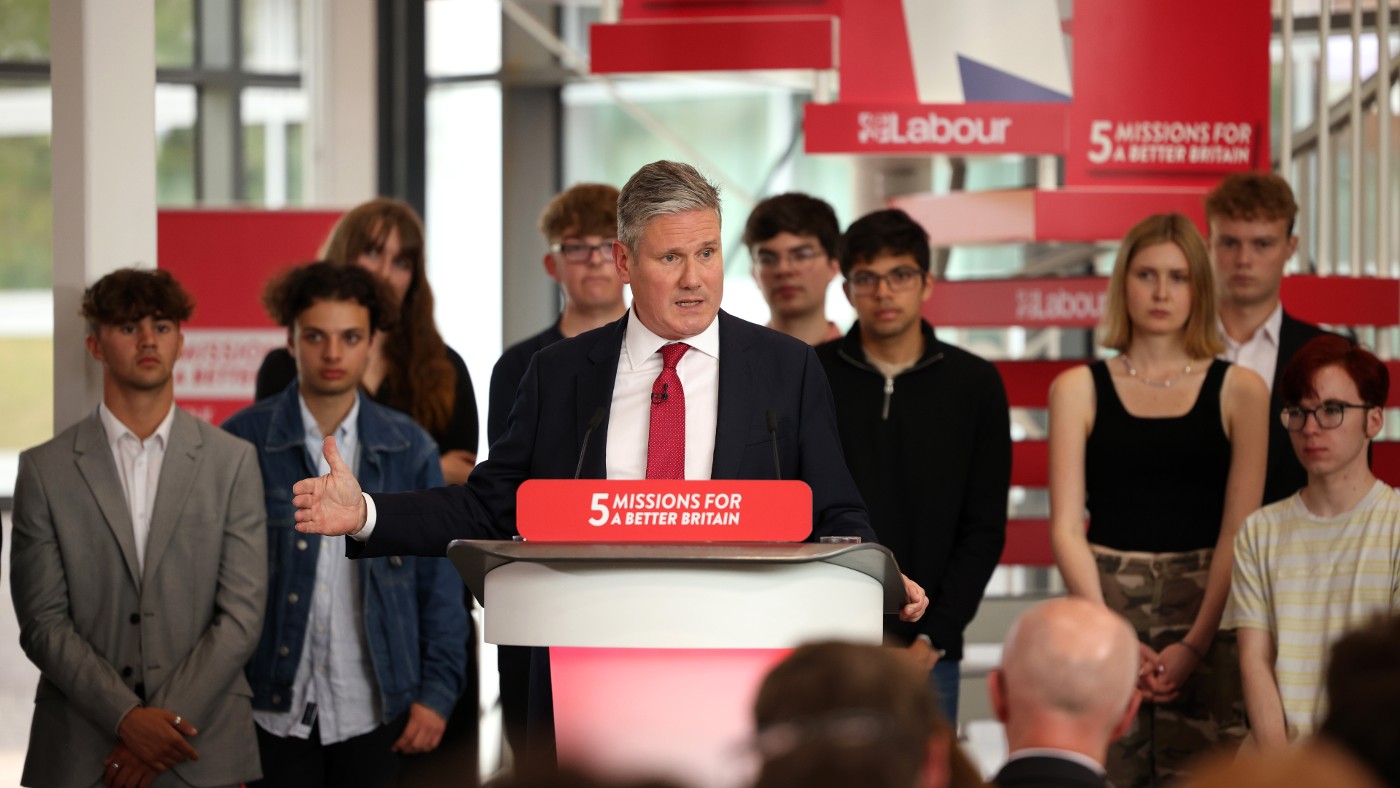Breaking the class ceiling: are Starmer’s speaking lessons the answer?
Labour leader believes ‘oracy’ classes can remove barriers for less privileged children

A free daily email with the biggest news stories of the day – and the best features from TheWeek.com
You are now subscribed
Your newsletter sign-up was successful
Keir Starmer has promised to smash the “class ceiling” by boosting education for poorer children.
In a speech yesterday, the Labour leader pledged to improve children’s speaking skills, or “oracy”, as part of a drive to break down class barriers to opportunity, reported the BBC.
“The inability to speak fluently is one of the biggest barriers to opportunity,” said Starmer. Being able to articulate ideas is key to “getting on and thriving in life”, he said, adding that “children with poor language skills at the age of five are six times less likely to reach the expected standard of English at 11”, said The Times.
The Week
Escape your echo chamber. Get the facts behind the news, plus analysis from multiple perspectives.

Sign up for The Week's Free Newsletters
From our morning news briefing to a weekly Good News Newsletter, get the best of The Week delivered directly to your inbox.
From our morning news briefing to a weekly Good News Newsletter, get the best of The Week delivered directly to your inbox.
But can his plan lead to meaningful social change?
‘Promising ideas’
Starmer’s speech “offers promising ideas” on how to “break the class ceiling”, said Andrew Marr on LBC.
“Oracy” means “fluent, grammatical, self-confident speaking, the kind of smooth ease in front of an audience that an Old Etonian would barely notice they have”, explained Marr. But it’s something that those “from less privileged backgrounds, struggle with all their lives”.
In a letter to The Times, former head teacher Mark Steed wrote that Starmer is “right to emphasise the importance of oracy in the school curriculum”.
A free daily email with the biggest news stories of the day – and the best features from TheWeek.com
“Having introduced lessons leading to public-speaking qualifications in UK independent schools and British schools overseas”, Steed has “seen the impact on teenagers’ confidence and articulacy”.
Annabel Thomas MacGregor, director of the English-Speaking Union, told the i news site that private schools have recognised the benefits of oracy “for a really long time,” but “we could really see this replicated across the state sector”.
There was also support from a former Labour spin doctor. “I am delighted that a commitment to teaching of oracy in schools is included as part of Labour plans for education,” tweeted Alastair Campbell, because “a confident nation breeds confident kids”.
‘Depressingly hard’
However, others focused on the steepness of the hill Starmer’s policy would have to climb, particularly after the austerity programme the coalition government began in 2010.
“Of course this doesn’t herald the shattering of class as we know it,” wrote Polly Toynbee for The Guardian.
Starmer’s missions “indicate the direction of travel and the party’s intent”, she added, “but every endeavour reminds us how depressingly hard it will be just to get back to the standards of 2010, let alone to progress”.
Another commentator argued that substance was as important as style. There’s “no point in speaking well unless you have something worthwhile to say”, Lindsay Paterson, professor of education policy at Edinburgh University, told The Herald.
If children are “hungry”, he continued, and if they “do not have access to books at home, if their internet connection is unreliable, if they are not stimulated by conversation at home”, then “no amount of training in public speaking will help them to succeed”.
Then there is the question of how long the changes will take to be felt. It will “probably take 10 years” to “train all the teachers to help the children that have got lifelong challenges and to recruit enough specialist speech and language therapists”, Jane Harris, chief executive of charity Speech and Language UK, told i news.
Chas Newkey-Burden has been part of The Week Digital team for more than a decade and a journalist for 25 years, starting out on the irreverent football weekly 90 Minutes, before moving to lifestyle magazines Loaded and Attitude. He was a columnist for The Big Issue and landed a world exclusive with David Beckham that became the weekly magazine’s bestselling issue. He now writes regularly for The Guardian, The Telegraph, The Independent, Metro, FourFourTwo and the i new site. He is also the author of a number of non-fiction books.
-
 Political cartoons for February 15
Political cartoons for February 15Cartoons Sunday's political cartoons include political ventriloquism, Europe in the middle, and more
-
 The broken water companies failing England and Wales
The broken water companies failing England and WalesExplainer With rising bills, deteriorating river health and a lack of investment, regulators face an uphill battle to stabilise the industry
-
 A thrilling foodie city in northern Japan
A thrilling foodie city in northern JapanThe Week Recommends The food scene here is ‘unspoilt’ and ‘fun’
-
 The Mandelson files: Labour Svengali’s parting gift to Starmer
The Mandelson files: Labour Svengali’s parting gift to StarmerThe Explainer Texts and emails about Mandelson’s appointment as US ambassador could fuel biggest political scandal ‘for a generation’
-
 Will Peter Mandelson and Andrew testify to US Congress?
Will Peter Mandelson and Andrew testify to US Congress?Today's Big Question Could political pressure overcome legal obstacles and force either man to give evidence over their relationship with Jeffrey Epstein?
-
 Reforming the House of Lords
Reforming the House of LordsThe Explainer Keir Starmer’s government regards reform of the House of Lords as ‘long overdue and essential’
-
 How long can Keir Starmer last as Labour leader?
How long can Keir Starmer last as Labour leader?Today's Big Question Pathway to a coup ‘still unclear’ even as potential challengers begin manoeuvring into position
-
 What is at stake for Starmer in China?
What is at stake for Starmer in China?Today’s Big Question The British PM will have to ‘play it tough’ to achieve ‘substantive’ outcomes, while China looks to draw Britain away from US influence
-
 Can Starmer continue to walk the Trump tightrope?
Can Starmer continue to walk the Trump tightrope?Today's Big Question PM condemns US tariff threat but is less confrontational than some European allies
-
 Alaa Abd el-Fattah: should Egyptian dissident be stripped of UK citizenship?
Alaa Abd el-Fattah: should Egyptian dissident be stripped of UK citizenship?Today's Big Question Resurfaced social media posts appear to show the democracy activist calling for the killing of Zionists and police
-
 Is Keir Starmer being hoodwinked by China?
Is Keir Starmer being hoodwinked by China?Today's Big Question PM’s attempt to separate politics and security from trade and business is ‘naïve’